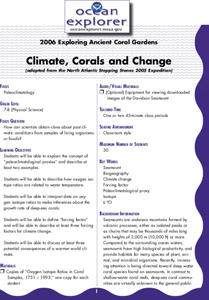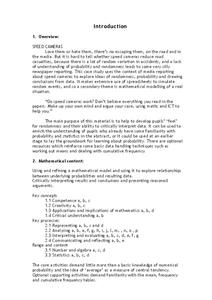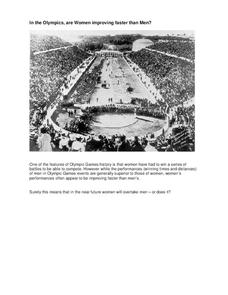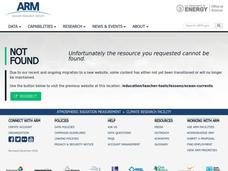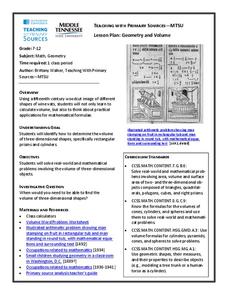California Academy of Science
Using Empirical Data in the Classroom: Raptor Migrations!
Raptor flight patterns align with seasonal changes in net primary productivity. Here is a thought-provoking lesson that uses empirical data from a video to help scholars understand raptor migrations, producers/consumers, and ecosystems....
Polar Trec
Do Microorganisms Live in Antarctica?
Can microorganisms live in the dry, cold climate of Antarctica? Young scientists view a research project measuring microorganisms in the Taylor Glacier. They record the findings from dirty ice, clean ice, boots, sediment, and more. Then...
Polar Trec
Ozone Data Comparison over the South Pole
Did you know the hole in the ozone is seasonal and filled by January every year? The instructional activity uses scientific measurements of the ozone over the South Pole to understand patterns. Scholars learn that the hole grew bigger...
Polar Trec
Permafrost Thaw Depth and Ground Cover
The thaw depth of tundra creates a positive feedback loop with both global warming and the carbon cycle. Scholars sort photos and develop a hypothesis for ground cover and permafrost depth. Then they review the data and measurements...
Polar Trec
Where in the World Is Our Teacher?
Kirk Beckendorf, a middle school teacher, joined researchers at the McMurdo Station in Antarctica to help maintain automatic weather stations. The lesson encourages pupils to track his travels around the region. They connect with the...
NOAA
Climate, Corals and Change
Global warming isn't just an issue on land; deep ocean waters are also showing troubling signs. Young scientists learn more about deep water corals and the many recent discoveries researchers have made. Then they examine data related to...
Insted
Bullying Around Racism, Religion and Culture
Racism, antisemitism, Islamophobia. How to counter prejudice-driven bullying in schools is the focus of a packet of materials that provides information and advice on how to respond to and prevent bullying, materials for in-service and...
Chicago Botanic Garden
Plant Phenology Data Analysis
Scientists monitor seasonal changes in plants to better understand their responses to climate change, in turn allowing them to make predictions regarding the future. The last activity in the series of six has scholars analyze BudBurst...
Chicago Botanic Garden
Historical Climate Cycles
Scientists use ice core samples to obtain temperatures of the earth from 400,000 years ago! The third of five lessons instructs pupils to interpret historical climate data to see changes over time. In part I, participants interpret...
Agency for Toxic Substances and Disease Registry
Don't Mess with Mercury (Lesson A)
Mercury is the only metal that is a liquid at room temperature. Teach your class this and many more interesting mercury facts by assigning an engaging task. A public relations activity, the exercise informs pupils of the hazards of...
Agency for Toxic Substances and Disease Registry
Don't Mess with Mercury (Lesson C)
The health effects of mercury exposure if the focus of the first of three activities about the properties of metals. Pairs research mercury to write, prepare, and share posters, articles, or PSAs with the class.
Bowland
Speed Cameras
Do speed cameras help reduce accidents? Scholars investigate this question using a series of spreadsheet activities. Along the way, they learn about randomness, probability, and statistical analysis.
Bowland
In the Olympics, are Women Improving Faster than Men?
Will the time come when women outperform men at the Olympic Games?Scholars investigate gender differences in Olympic Games performances. They study the historical participation of women and then analyze data to determine if women will...
Rainforest Alliance
Investments in Forest Carbon
One hundred metric tons of CO2 can accumulate in one acre of forest over time—that's a lot of carbon! In the activity, groups of middle school learners determine what makes forests important. They then solidify the concept by using a...
Rainforest Alliance
Forests of Guatemala
With 90 percent of its land area covered in forests, Suriname, a country in South America, contains the largest percentage of forests throughout the world. Here is an activity that brings classmates together to learn about the...
WindWise Education
Where Do You Put a Wind Farm?
This is not your ordinary farm! Using a case study, small groups study two proposed locations for a wind farm. After researching all the information about the sites, the groups choose a site. Each team member writes up the proposal...
WindWise Education
How Do You Feel About Wind Energy?
Tell me what you really think. The class reviews articles related to wind energy to see how the author uses words, phrases, and images to sway the reader. Through a class discussion, individuals share their feelings from the media...
WindWise Education
Can We Reduce Risk to Bats?
It is just batty! A resource outlines a case study scenario of reducing the risk to bats. Teams learn about the bat populations in the area of the wind farm, then research and propose a solution.
Southwestern Medical Center
Field Epidemiology: Investigation of an Unknown Disease
More than 90 percent of the people in a building have come down with an illness, and it is your job to investigate. Teachers give scientists the data needed to decide what is important and how they can solve the mystery. The exercise is...
Climate Research Facility
Ocean Currents
Young scientists investigate the effects of heating a beaker of ice water by dropping dye into the water and observing how the color circulates.
K12 Reader
Jabberwocky
Readers demonstrate their ability to use word endings and word relationships to identify the parts of speech of the nonsense words in Lewis Carroll's "Jabberwocky."
Stories on the Way
The Temptation of Jesus
Temptation is the focus of this lesson plan, which was designed for the first week of Lent as an introduction to the tradition of Lenten fast. It includes reading of biblical scripture, hands-on activities where learners design cards...
Virginia Department of Education
Geometry and Volume
The history of math is fascinating! Utilize a woodcut primary source image from 1492 and posters from the 1930s to help geometers apply their volume-calculation skills to real-life questions.
Cheetah Outreach
Nutrition
What can teeth tell us about an animal's diet? Learners examine animal skulls to determine what their canines, incisros, premolars, and molars reveal.







